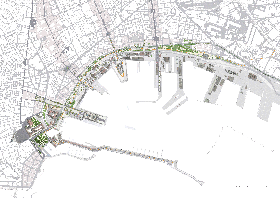Naples port-city | Strategies for a new integration of waterfront urban space
DOI:
https://doi.org/10.6092/2281-4574/2704Keywords:
Urban regeneration, waterfront, public space, Naples, port cityAbstract
he importance of the waterfront redevelopment strategies within the economic, social and environmental aspects of the contemporary city sheds light on the note and the complex issue of the relationship between city and port: the port is specialized territory separated from the ordinary flow of a city that can less and less reach the sea. It therefore proposes a new approach to the subject that manages to combine the specialized nature of the port infrastructures so to have a city return to the sea, protecting the maritime identity and ensuring the implementation of urban areas where the mingling of different functions become distinctive with an added value in coastal zones subject to transformation.
The results of the analysis and the strategy proposed for Naples, do not just operate on the edge but also question the logics of a stiff introverted harbour system, so allowing integration between city and port area through the design of public spaces, hybrid landscapes by which city, harbor and water become part of a unique system.
The landscape character of the waterfront, the integration between urban space and port area, the definition of public places such as hybrid spaces, the efficiency of the port system and the dual reading transversal and longitudinal of port city system, become project materials, thus joined in relation to the territorial transformations in place, leading to the spatial configuration of the intervention as to urban regeneration. The article is a summary of the thesis entitled “Naples port city. Strategies for a new integration of urban port space” developed in the academic year 2012/2013 at the Department of Architecture of the Polytechnic School of Basic Sciences, University of Naples “Federico II”, and the Institute for Service Industry Research (IRAT) of the National Research Council of Italy (CNR). The dissertation has been prepared with the thesis advisor Prof. Arch. Michelangelo Russo, Full Professor of Planning at the University of Naples, and the assistant supervisor Prof. Arch. Massimo Clemente, Research Directorof the CNR IRAT.
Downloads

Downloads
Published
Issue
Section
License
Gli autori che pubblicano su questa rivista accettano le seguenti condizioni:- Gli autori mantengono i diritti sulla loro opera e cedono alla rivista il diritto di prima pubblicazione dell'opera, contemporaneamente licenziata sotto una Licenza Creative Commons - Attribuzione che permette ad altri di condividere l'opera indicando la paternità intellettuale e la prima pubblicazione su questa rivista.
- Gli autori possono aderire ad altri accordi di licenza non esclusiva per la distribuzione della versione dell'opera pubblicata (es. depositarla in un archivio istituzionale o pubblicarla in una monografia), a patto di indicare che la prima pubblicazione è avvenuta su questa rivista.
- Gli autori possono diffondere la loro opera online (es. in repository istituzionali o nel loro sito web) prima e durante il processo di submission, poiché può portare a scambi produttivi e aumentare le citazioni dell'opera pubblicata (Vedi The Effect of Open Access).

